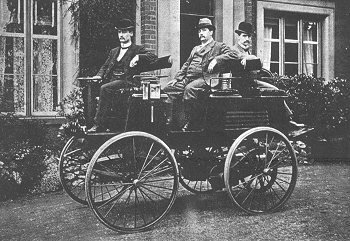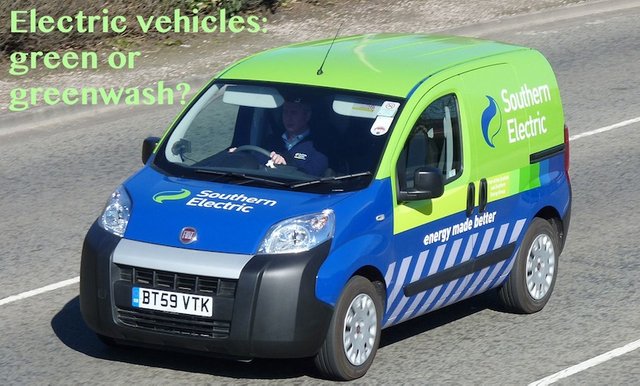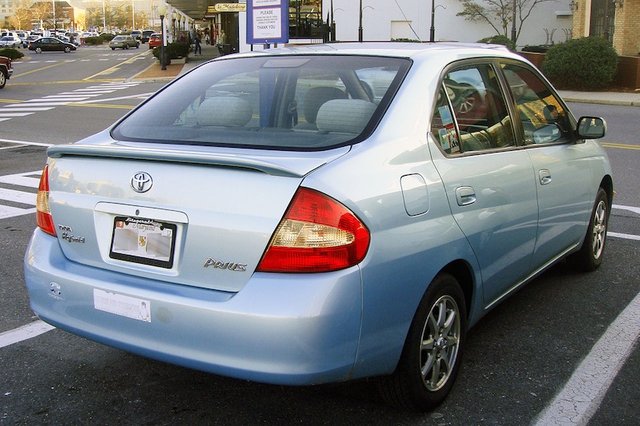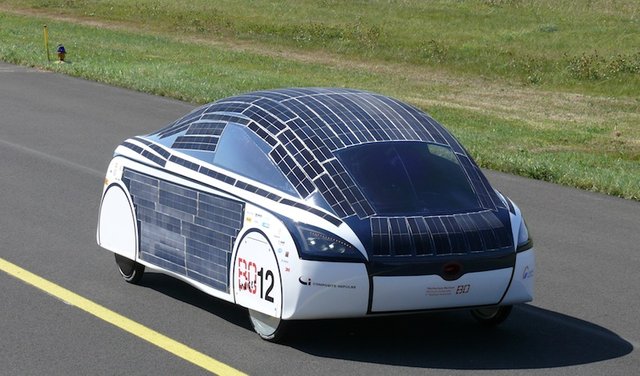How Green is your electric car?
Governments all over Europe are rushing in technology that will use up limited natural resources, produce enormous levels of unsustainable waste, and whose production is likely to utilise child labour.
But some of the world's biggest mining companies are set to make fortunes from mass production of batteries to power electric cars.
Electric cars are being promoted under the banner of “environmentalism” as a “clean, green” technology that will not pollute the air that we breathe.
The UK government is to outlaw petrol and diesel cars by 2040, and according to a report last month in Autocar magazine, vehicles unable to travel more than 50 miles using electric power, including dual-fuel hybrids, could also be outlawed by that date.
Photo by Mario Roberto Duran Ortiz
The Scottish National Party (SNP), currently in power in Scotland, has announced plans to phase out new petrol and diesel cars by 2032.
Paris and Rome are to ban all diesel cars by 2024, and the city of Oxford in the UK is to ban all petrol and diesel cars from its city centre by 2020- less than two years away.
This might all sound very environmentally friendly, however mass production of electric cars is anything but "green". Most electric cars are powered by lithium-ion batteries similar to the ones that power our mobile phones and tablets, only much larger.
Lithium-ion batteries are produced using rare earth metals like cobalt, lithium carbonite and graphite. These metals are found in just a few places on earth, such as the Democratic Republic of Congo, where around 65% of the world's supply of cobalt is extracted. As many as 40,000 children are believed to be employed in mining in the DRC, some of them as young as seven.
Safety concerns
Lithium-ion batteries run a greater fire risk than lead-acid batteries, as they use a flammable electrolyte. Some manufacturing firms are trying to develop batteries that use alternative metals, but the race to replace petrol and diesel-powered vehicles with electric ones appears to be paying little heed to these concerns.
Waste
Lithium-ion batteries have a life expectancy of 10 years, or 150,000 miles. The cost of replacing them is likely to be around 40% of the cost of the vehicle when new.
The cost to the earth could be considerably greater, as little thought has been given the disposal of the used batteries. Most lithium in Europe is either dumped in landfill or incinerated, with just 5% collected for recycling.
However companies like Canadian First Cobalt, and the UK's Glencore, which controls almost a third of the global annual supply of cobalt, are likely to make fortunes out of the global push for electric motor transport, with the world lithium-ion market expected to be worth more than $74bn by 2024.
Batteries need to be charged, even lithium-ion ones. Where's the electricity to charge all these cars going to come from? More wind farms? Nuclear power stations? Governments are already struggling to fulfil their renewable energy targets. The number of cars in the UK alone is almost 32 million. Providing sufficient electricity to power this number of vehicles is going to be some feat.
Unless people can be persuaded to stop travelling...
Taxation and increasingly high parking fees are already being used to discourage people from driving in city centres. Taxation is being used to reduce the number of high emission vehicles. I expect that various types of tax will be used to try and stop people travelling by car.
With public transport already increasingly expensive, we will probably see more proposals to encourage people to stay in the cities and to travel increasingly less. An article recently published in the Guardian newspaper suggests that restrictions to air travel and private transport may indeed be considered as part of the UK government's zero carbon policy.
Electric cars have been around for over a century. They could have been introduced decades ago, in a more gradual, sustainable manner, alongside other types of vehicle propulsion.

Electric vehicles are ideal for getting around city centres, while other types of technology could be used for travelling greater distances. That approach might ease the burden on the world's resources while also reducing emissions.
But it might not have allowed fortunes to be made from more mass production, and by multinational mining companies and their CEOs.
It wouldn't have presented an excuse for more taxation and new controls of our city centres, or "smart" toll roads.
It wouldn't have allowed a few people to make vast profits out of very unenvironmentally-friendly "greenwashing" policies.
Sources
The Guardian: Carmakers electric dreams depend on supplies of rare minerals
The Guardian: Electric cars may stall without a battery revolution
Friends of the Earth factsheet on Lithium
.gif)





The money trail is always a good place to start when looking at new laws, so it was no shock to see that the a UK and a Canadian company are major stake holders in the Kobalt mines. I would guess the government also plays a role if not owns the electric company as well, so they would benefit as well selling more power to charge the cars, the only losers in the equation are the consumers, big oil, and the auto makers who built gas & diesel model autos.
I didn't check your link on the cars that could run on water, I already know that technology has existed for decades and has zero pollution. I guy here in the USA proved it and after a couple visits from the government ended up dead and his working model ended up confiscated if memory serves me correctly. It and he were to big of a threat to the oil companies.
Yes, the disturbing case of Stanley Meyer! I think people should just go ahead and make vehicles powered by water, beans or whatever will work, without fanfare. Though they'd probably be stopped on "safety" grounds.
It was pretty clear to me that Stanley's biggest mistake was having the US military come "look" at what he was doing so that they might be able to incorporate his invention into the armed forces transportation vehicles.
Once that happened he ended up a dead man.
That was probably part of it, but he courted publicity and gave talks warning about the "New World Order" too. He was probably seen as a threat to those in power.
Yes, but just warning about NWO doesn't get you killed, otherwise old man George Bush would have been dead long ago, he gave speeches in which he told us that the world was about to have "a New World Order and when we are successful, and we will be" the problem was that most Americans took that as the USA being the NWO, which was not the "NWO" he was talking about, the elites that want to rule and own the world.
Now a days, anyone who actually believes in the constitution is considered as a "domestic terrorist threat", that right there should be enough to scare the hell out of any sane thinking person.
When the founding documents of the nation are thought to be a threat to how the nation is being run by the people running the nation the citizens should realize that they are nothing more than sheep being taken to be sheered and slaughtered.
I totally agree, and it scares me that the UK government keeps threatening to give us a written constitution, because I have no idea what they would include in it, but it would probably replace our Bill of Rights. People often take our relative peace for granted, but it actually comes out of the revolutions of the past, and we allow governments to overturn these hard-won gains at our peril.
I think that the problems of the electric cars are going to be solver sooner rather than later.
The car makers can be forced to provide sources for the lithium they use. Plus, the lithium won't be thrown out like small batteries, because cars are recycled and disposed in a very specific and controlled way, at least in Europe and in the US.
Lastly the energy is more and more green as the prices drop year by year on renewable energies.
So in the long term we will be green and so will the electric cars.
Did you know that 90% of the world's cocoa comes from working the same children in Africa?
https://en.wikipedia.org/wiki/Child_labor_in_cocoa_production
Child labor in cocoa production
The widespread use of children in cocoa production is controversial, not only for the concerns about child labor and exploitation, but also because, as of 2015, up to 19,000 children working in Côte d'Ivoire, the world's biggest producer of cocoa, may have been victims of trafficking or slavery. Attention on this subject has focused on West Africa, which collectively supplies 69% of the world's cocoa, Côte d'Ivoire in particular, supplying 35%. Thirty percent of children under age 15 in sub-Saharan Africa are child laborers, mostly in agricultural activities that includes cocoa farming. It is estimated that more than 1.8 million children in West Africa are involved in growing cocoa.
I seriously hope that is the case, but I think we have to call out governments on this, because otherwise they will just pander to the demands of the multinationals who are set to make vast profits from this technology being introduced on such a mass scale.
And no matter how much the price of renewables falls, we're still going to need a lot more sources of electric power to meet the demand for these vehicles.
I do know that much of the world's cocoa is supplied via very unethical methods, and I never buy chocolate from the big multinational producers. Apart from anything else, the quality has fallen enormously in recent years. When I buy chocolate, I get either Willie's or Divine, both fairtrade suppliers and much tastier!
That is a good thought. A lot of companies claims to be going green and eco friendly but the waste it leaves behind should also be considered. I guess it's all about the profit. Unless they find a better alternative where everyone wins.
Absolutely - so often it's all about the profits. I think it's up to all of us to scrutinise these innovations when they're being introduced on such a large scale, and to hold our leaders to account.
The British government keep changing they minds about what's good and bad in terms of fuel types for our cars.
Only a few years ago, diesel was the thing they wanted us to have and now its being condemned again. It gets annoying.
It gets very annoying! I think they change their minds according to how much money they and/or their business lobbyists can make out of it. Just call me a cynic...
Congratulations! This post has been chosen as one of the daily Whistle Stops for The STEEM Engine!
You can see your post's place along the track here: The Daily Whistle Stops, Issue #159 (6/8/18)
The STEEM Engine is an initiative dedicated to promoting meaningful engagement across Steemit. Find out more about us and join us today.
Excellent article. I learned a lot of interesting and cognitive. I'm screwed up with you, I'll be glad to reciprocal subscription))